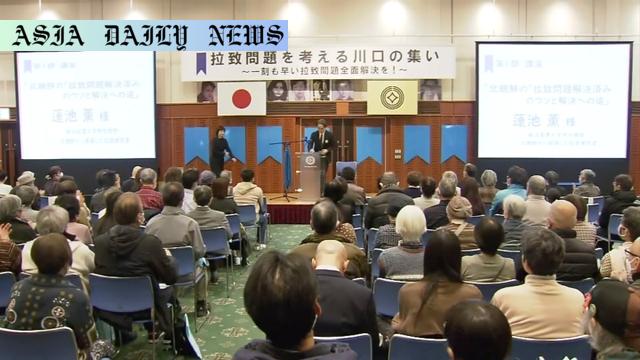Abductees: Former abductee and son of another urge Japan to act.

A Call for Concrete Action on Abductee Resolution
The issue of Japanese citizens abducted by North Korea remains an unresolved chapter in modern diplomacy. At a recent event in Kawaguchi City, near Tokyo, two individuals directly affected by this tragic situation implored the Japanese government to intensify its efforts in securing the return of those abducted. Hasuike Kaoru, who was forcibly taken in 1978 and returned to Japan in 2002, and Iizuka Koichiro, son of abductee Taguchi Yaeko, voiced their frustrations and hopes. Their united appeal underscores not only personal pain but also the ongoing lapse in governmental response to the issue.
The Painful 20-Year Stalemate
Hasuike Kaoru is one of the five abductees who miraculously returned to Japan following a Japan-North Korea summit in 2002. However, since this release, no visible progress has been achieved concerning the fate of the remaining abductees. Hasuike highlighted that two decades have passed with no tangible results, underscoring the Japanese government’s inaction. He stated that creating an international environment where North Korea cannot make excuses is crucial, emphasizing the urgency of pushing Pyongyang toward resolution.
Taguchi Yaeko: A Life of Sacrifice
Iizuka Koichiro spoke poignantly about his mother, Taguchi Yaeko, who was abducted in 1978. Taguchi’s tragic story twists further as it is revealed she served as a Japanese language teacher for former North Korean spy Kim Hyun Hee, who was implicated in the disastrous 1987 bombing of a South Korean passenger airplane. Iizuka expressed his determination to fulfill his late uncle, Iizuka Shigeo’s wish to reunite their family. His emotional testimony reflects the rising generational call for action in bringing closure to these unresolved tragedies.
Diplomatic Pressure & International Collaboration
Hasuike and Iizuka pointed out that North Korea’s claims that certain abductees have died are likely untrue and serve the regime’s self-interests. Hasuike asserted that all abductees were likely alive at the time of North Korea’s original admissions. The speakers stressed the importance of leveraging international collaboration, particularly with the United States. They pointed to former US President Donald Trump’s engagements, where abductees’ issues were brought to global prominence, as an example of how Japan could enlist powerful allies in its cause to pressure Pyongyang.
Beyond Diplomacy: A Moral Obligation
The ongoing saga of the abductees is not solely a diplomatic matter but a moral one. Families torn apart have lived through decades of uncertainty, with many unable to reunite or even receive conclusive answers about their loved ones’ fates. The Japanese government faces mounting pressure to apply more proactive and assertive measures, ensuring North Korea cannot continue stalling.
A Path Forward
The recent event in Kawaguchi brought once again into focus the unresolved suffering of abductee families. North Korea’s actions represent not only violations of international law but also a callous indifference to individual human lives. Japan must utilize all avenues of diplomacy, international alliances, and moral high ground to ensure the safe return of its abducted citizens. This issue should remain high on Japan’s diplomatic priorities until every family receives the closure they deserve.
Commentary
The Complexities of the Abductee Issue
The Japanese abductee issue is not merely a question of diplomacy but also one of justice and humanity. Every individual abducted represents a family left to grapple with uncertainties and heartbreak. For decades, they have waited for answers, and yet progress remains painfully slow. Hasuike Kaoru and Iizuka Koichiro’s recent statements highlight the urgency for a renewed focus on this issue, which should compel the Japanese government to take decisive action.
International Collaboration: The Key to Progress?
One of the critical points raised during the Kawaguchi event was the importance of international collaboration. Particularly with the United States, Japan’s most powerful ally, exerting pressure on North Korea becomes plausible. The engagement of former US leaders like Donald Trump briefly brought the issue to the global stage, but consistent efforts are needed to maintain momentum. This tragic situation exposes the need for a strategic, united front among global powers to address Pyongyang’s international violations.
A Moral Imperative for Action
Beyond political maneuvering lies a moral responsibility. Families like the Iizukas have endured lifetimes of grief and separation. It is crucial that nations like Japan not only acknowledge but also act to resolve such egregious human rights violations. For too long, political deadlock and inactivity have hindered progress. Japan must rise above these complexities and deliver justice to its citizens.
Economic Sanctions and Public Awareness
Finally, economic sanctions, coupled with heightened global awareness, could serve as additional levers to pressure North Korea. Citizens and activists must continue to advocate for these efforts. Only through such combined strategies can Japan hope to bring closure to the abductees and their families.


